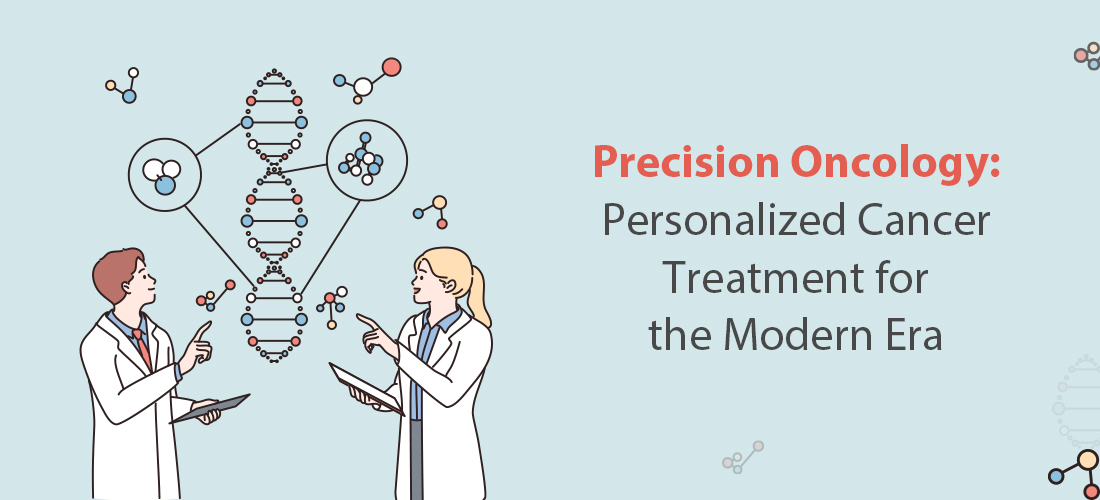Precision Oncology
Dr Asif Shaikh | 18 Jun 2025Share:

Precision Oncology: Personalized Cancer Treatment for the Modern Era
In the past, cancer treatment followed a “one-size-fits-all” approach—patients with the same type of cancer often received the same chemotherapy or radiation regimen. But cancer is not one disease, and each tumour can behave differently, even within the same organ. This is where Precision Oncology comes in—a transformative approach that tailor's treatment to the unique genetic makeup of each patient and their tumour.
What is Precision Oncology?
Precision oncology (also called personalized cancer medicine) is a modern approach that uses genetic, molecular, and environmental information to guide cancer diagnosis, treatment, and prevention. Rather than relying solely on the cancer’s location (e.g., lung or breast), precision oncology dives deeper looking at the mutations, gene expression, and biomarkers that drive everyone's cancer.
This allows oncologists to choose the right treatment, for the right patient, at the right time—maximizing benefits and minimizing unnecessary side effects.
How It Works: A Closer Look
Genomic Testing (Next-Generation Sequencing)
Tumour tissue or blood (liquid biopsy) is analysed for mutations, fusions, amplifications, or deletions in key cancer-related genes (like EGFR, KRAS, ALK, BRCA, etc.).
Targeted Therapy Selection
If a “targetable” mutation is found, a precision drug can be prescribed that blocks that specific pathway. For example, EGFR inhibitors in lung cancer or BRAF inhibitors in melanoma.
Predicting Response & Resistance
Precision tools can identify which patients are more likely to respond to certain treatments—or not respond at all—helping avoid ineffective therapies.
Monitoring & Adapting
Molecular profiling can be repeated over time to monitor resistance mutations and adjust treatment plans accordingly.
Real-World Example: A Lung Cancer Breakthrough
A 55-year-old non-smoker is diagnosed with advanced non-small cell lung cancer. Instead of starting chemotherapy immediately, her oncologist orders a genomic panel. The results reveal an EGFR mutation—a common driver in certain lung cancers. Because of this, she is started on a targeted EGFR inhibitor, which specifically blocks the cancer-driving mutation.
The result? A better response, fewer side effects, and improved quality of life compared to traditional chemotherapy.
Advantages of Precision Oncology
- Personalized Treatment - Improves accuracy by aligning therapy with tumour biology.
- Better Outcomes - Increases the chances of response and survival in mutation-driven cancers.
- Reduced Toxicity - Avoids unnecessary or ineffective treatments.
- Enables Immunotherapy Selection - Biomarkers like PD-L1 or MSI-H/dMMR help decide who benefits most from immunotherapy.
Limitations and Challenges
While promising, precision oncology is not without its challenges:
- Not all cancers have targetable mutations.
- Access to genomic testing and drugs may be limited or costly in some regions.
- Tumour heterogeneity: A single biopsy may not reflect the entire tumour's genetic landscape.
- Resistance mutations can emerge, requiring ongoing monitoring and treatment adaptation.
Despite these hurdles, the field is rapidly evolving, and more accessible, cost-effective solutions are being developed.
Future of Precision Oncology
Precision oncology is expanding beyond DNA. Future strategies include:
- Proteomics and metabolomics to understand cancer at multiple biological levels
- AI-driven predictive models for treatment response
- Liquid biopsies for real-time, non-invasive cancer monitoring
- Integration with immuno-oncology, combining genomics and immune profiling for even better results
Conclusion
Precision oncology represents a new era in cancer care—where treatment is no longer based solely on “where” the cancer is, but “what” it is at a molecular level. By understanding each tumour's unique genetic fingerprint, doctors can customize therapies, reduce side effects, and improve outcomes.
In short, precision oncology is not just the future—it’s the present, reshaping how we fight cancer one patient at a time.



